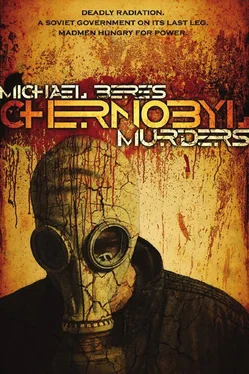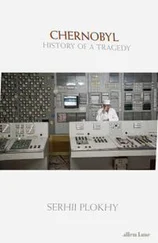Michael Beres - Chernobyl Murders
Здесь есть возможность читать онлайн «Michael Beres - Chernobyl Murders» весь текст электронной книги совершенно бесплатно (целиком полную версию без сокращений). В некоторых случаях можно слушать аудио, скачать через торрент в формате fb2 и присутствует краткое содержание. Жанр: Триллер, на английском языке. Описание произведения, (предисловие) а так же отзывы посетителей доступны на портале библиотеки ЛибКат.
- Название:Chernobyl Murders
- Автор:
- Жанр:
- Год:неизвестен
- ISBN:нет данных
- Рейтинг книги:4 / 5. Голосов: 1
-
Избранное:Добавить в избранное
- Отзывы:
-
Ваша оценка:
- 80
- 1
- 2
- 3
- 4
- 5
Chernobyl Murders: краткое содержание, описание и аннотация
Предлагаем к чтению аннотацию, описание, краткое содержание или предисловие (зависит от того, что написал сам автор книги «Chernobyl Murders»). Если вы не нашли необходимую информацию о книге — напишите в комментариях, мы постараемся отыскать её.
Chernobyl Murders — читать онлайн бесплатно полную книгу (весь текст) целиком
Ниже представлен текст книги, разбитый по страницам. Система сохранения места последней прочитанной страницы, позволяет с удобством читать онлайн бесплатно книгу «Chernobyl Murders», без необходимости каждый раз заново искать на чём Вы остановились. Поставьте закладку, и сможете в любой момент перейти на страницу, на которой закончили чтение.
Интервал:
Закладка:
Vasily drove very fast away from Pripyat. The road west was bumpy and they all hung on. With the windows closed, it was hot in the car. Juli glanced out the rear window and saw several other cars heading west. Beyond the cars she saw the tops of apartment buildings-hers, Mihaly’s, and everyone else’s-disappearing behind them. South of the buildings, smoke from Chernobyl’s unit four rose into the bright spring sky. When the road dove into a wooded area, Pripyat disappeared. In the front seat, Marina held onto Vasily’s arm. In the back seat, Juli and Vasily’s mother and sister looked to one another with tears in their eyes. The road became narrower, the woods closed in, and the spring day grew dark.
Although he stayed back from the car carrying Juli Popovics, Pavel sped up when he saw the men standing in the road. The men parted as they passed, but one managed to smash a rear side window with a brick.
“Everyone’s gone crazy!” shouted Nikolai.
“They’d better keep their shitbox going,” said Pavel. “Look at the smoky exhaust.”
“What kind of car is it?”
“An old Zaporozhets painted about fifty times. But they didn’t get a window smashed.”
“I wish we had guns,” said Nikolai.
“We’re lucky Captain Putna assigned us a car.”
“You and I recruited to follow Juli Popovics makes me think,” said Nikolai. “What if there is something to the Gypsy Moth connection and the Horvath brothers?”
“Conspiracy and sabotage,” said Pavel. “You’re beginning to think like Major Komarov.”
“I’m not kidding,” said Nikolai. “I wonder how things are at the post office.”
“Do you wish you were back there?” asked Pavel.
Nikolai tied his handkerchief over his mouth and nose. “The PK wasn’t such a bad life.”
As Pavel drove, Nikolai helped out by tying Pavel’s handkerchief. Then the two PK agents raised their coat collars against the wind from the broken back window and followed the Zaporozhets into the countryside.
Late Sunday afternoon, two convoys of army trucks and buses converged on the area around the Chernobyl plant. One convoy concentrated on villages and the town of Chernobyl south of the plant.
The second convoy led a group of buses to reinforce those already sent to Pripyat, the population center nearest the plant. On the way to Pripyat, several buses detoured to Kopachi, the closest village to the plant. The people of Kopachi were in a state of panic, and when the buses left, each with an armed soldier onboard, dogs belonging to people from the village chased the buses speeding away.
After pausing at Kopachi, the rest of the convoy headed to Pripyat on back roads in order to avoid driving too close to the plant.
The Sunday evening sun was low in the sky. It would be the second sunset since the Chernobyl Power Station explosion.
Several kilometers from the entrance to the plant, lights powered by a generator illuminated tents being set up in a ditch along the back road by soldiers assigned to assist firefighters and rescue personnel. When the convoy passed the makeshift emergency headquarters, wind from the vehicles shook the tents, almost knocking them down as they were being set up.
Colonel Gennady Zamyatin of the army’s Ukrainian border force was a veteran of the Great Patriotic War long past traditional retirement. He held on to the center post of the headquarters tent as the convoy roared past. Radio equipment had already been brought into the tent. The radio dials were lit up, and a member of the technical unit was wiring the equipment to a makeshift antenna on the raised bank alongside the ditch. Colonel Zamyatin smiled as the convoy passed. The sound reminded him of the Great War, and despite what he knew about the tragedy at the Chernobyl plant, he felt happy for the first time in years.
A truck from the rear of the convoy veered off the roadway and came to a skidding stop at the side of the road near Colonel Zamyatin’s tent. Soviet Army Captain Ivan Pisarenko jumped from the truck and ran down the embankment to the headquarters tent. Inside the tent Colonel Zamyatin and Captain Pisarenko quickly introduced themselves, grasping hands and staring into one another’s eyes. Both knew the seriousness of the Chernobyl explosion. Both had been briefed by superiors who counted on them to take charge.
Although Zamyatin showed his age, he was a sturdy, red-cheeked man with bright eyes and an upturned nose. Captain Pisarenko was taller, more muscular, and much younger.
“My convoy will be in Pripyat tonight,” said Pisarenko. “I’ve got ten trucks, fifty men, and seventy-three buses from Kiev. Do you have any news?”
“Pripyat is close to the plant, and radiation is bad there,” said Zamyatin. “They’ve been rinsing streets and even some of the buildings because of radioactive dust from the explosion. I’ve been told they had to chase people away who walked to the plant. The first buses took many away along with injured firefighters. Have your men cover their faces as much as possible. Try not to breathe in smoke from the fire or dust in the air.”
“What’s happening at the power plant?”
“The core exploded, setting the graphite on fire, so it’s best to avoid the area as much as possible. That’s why we’re setting up here.
Water on the fire is ineffective. Many of the early firefighters and workers from the plant were exposed to extreme radiation. I saw men vomiting blood. The serious cases were flown out, headed to the radiation hospital in Moscow. Yesterday helicopters dropped tons of sand on the core. Although somewhat diminished, the fire continues. Today they dropped boric acid and lead along with sand on it. With people living so close to the plant, it’s a terrible situation.
It reminds me of the Great War when the Nazis rounded up Jews and Gypsies. I don’t know what’s going to happen to all these people.”
“Moscow is ordering collectives to make room,” said Captain Pisarenko. “They’re also recruiting the komsomols to help. For now, the health ministry gave me boxes of iodine pills to be handed out as people board the buses. We’ll tell residents they’ll be gone a few days at most. One of my men suggested we have parents tell their children they are going on holiday, or to the circus. Anything to move them along. And only one suitcase per person.”
Colonel Zamyatin shook his head sadly. “I was preparing for my retirement on a farm near here when they called me. I sent my wife to Kiev as soon as I heard what had happened. Nothing of this scale lasts only a few days.”
“I agree,” said Pisarenko. “The people of the village of Kopachi know how serious this is. We got them out of their houses at gunpoint.
Some of them were puking as they boarded the buses.” Pisarenko paused, wiped his forehead with his sleeve. “When the buses turned around to head south, neighborhood dogs chased them.”
Both were silent a moment.
Captain Pisarenko shook Colonel Zamyatin’s hand. “I hope we meet again.”
One of the radios on a table squealed to life as the technician adjusted the knobs. A loud voice boomed out question after question.
“Who the hell is that?” asked Pisarenko.
“Who else?” said Zamyatin. “The KGB. It’s their office in Kiev interfering with the emergency frequencies, wanting to know every fucking detail while they sit on their asses!”
“I’ll go now, Colonel.”
“Good luck, Captain.”
Captain Pisarenko ran up the embankment to his truck, ordering the driver to go before he landed in the seat. The truck sped off after the rest of the convoy and caught up as the line of trucks and buses drove past signs welcoming visitors to Pripyat. Although the sun had set and it was rapidly growing dark, the messages could still be seen. Among the messages were, “The Ideas of Lenin Are Im-mortal” and “The Proletariat Will Triumph.”
Читать дальшеИнтервал:
Закладка:
Похожие книги на «Chernobyl Murders»
Представляем Вашему вниманию похожие книги на «Chernobyl Murders» списком для выбора. Мы отобрали схожую по названию и смыслу литературу в надежде предоставить читателям больше вариантов отыскать новые, интересные, ещё непрочитанные произведения.
Обсуждение, отзывы о книге «Chernobyl Murders» и просто собственные мнения читателей. Оставьте ваши комментарии, напишите, что Вы думаете о произведении, его смысле или главных героях. Укажите что конкретно понравилось, а что нет, и почему Вы так считаете.












